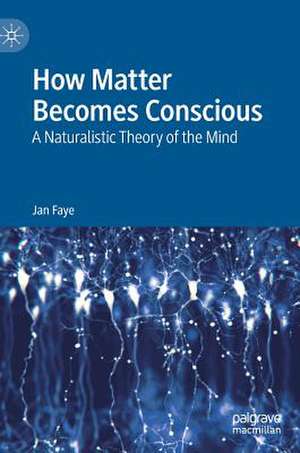How Matter Becomes Conscious: A Naturalistic Theory of the Mind
Autor Jan Fayeen Limba Engleză Hardback – 26 apr 2019
This innovative book proposes a unique and original perspective on the nature of the mind and how phenomenal consciousness may arise in a physical world. From simple sentient organisms to complex self-reflective systems, Faye argues for a naturalistic-evolutionary approach to philosophy of mind and consciousness. Drawing on substantial literature in evolutionary biology and cognitive science, this book offers a promising alternative to the major theories of the mind-body problem: the quality of our experiences should not, as some philosophers have claimed, be associated with subjectivity that is not open for scientific explanation, nor should it be associated with intrinsic properties of the brain. Instead, Faye argues that mental properties are extrinsic properties of the brain caused by the organism’s interaction with its environment. Taking on the explanatory gap, and rejecting the ontological pluralism of present naturalist theories of the mind, Faye thus proposes aunified view of reality in which it is possible to explain qualitative mental presentations as part of the physical world.
Preț: 524.80 lei
Preț vechi: 632.29 lei
-17% Nou
Puncte Express: 787
Preț estimativ în valută:
100.42€ • 103.60$ • 83.80£
100.42€ • 103.60$ • 83.80£
Carte disponibilă
Livrare economică 05-19 martie
Livrare express 19-25 februarie pentru 35.49 lei
Preluare comenzi: 021 569.72.76
Specificații
ISBN-13: 9783030161378
ISBN-10: 3030161374
Pagini: 337
Ilustrații: XVIII, 329 p. 1 illus.
Dimensiuni: 148 x 210 x 25 mm
Greutate: 0.58 kg
Ediția:1st ed. 2019
Editura: Springer International Publishing
Colecția Palgrave Macmillan
Locul publicării:Cham, Switzerland
ISBN-10: 3030161374
Pagini: 337
Ilustrații: XVIII, 329 p. 1 illus.
Dimensiuni: 148 x 210 x 25 mm
Greutate: 0.58 kg
Ediția:1st ed. 2019
Editura: Springer International Publishing
Colecția Palgrave Macmillan
Locul publicării:Cham, Switzerland
Cuprins
Chapter 1: Flipping the Debate.- Chapter 2: Our Animal Mind.- Chapter 3: Subjectivity in a Biological Perspective.- Chapter 4: A Difference That Is No Difference.- Chapter 5: Why Identity Is Not Enough.- Chapter 6: Functionalism, Mechanisms, and Levels of Reality.- Chapter 7: The Environment Is What Matters.- Chapter 8: Understanding Consciousness.- Chapter 9: Conclusion.
Notă biografică
Dr. Jan Faye, University of Copenhagen, Denmark, is a philosopher who has written extensively on topics in philosophy of science, metaphysics, and epistemology. His previous books include After Postmodernism (2012), The Nature of Scientific Thinking (2014), and Experience and Beyond (2016) all published by Palgrave Macmillan.
Textul de pe ultima copertă
This innovative book proposes a unique and original perspective on the nature of the mind and how phenomenal consciousness may arise in a physical world. From simple sentient organisms to complex self-reflective systems, Faye argues for a naturalistic-evolutionary approach to philosophy of mind and consciousness. Drawing on substantial literature in evolutionary biology and cognitive science, this book offers a promising alternative to the major theories of the mind-body problem: the quality of our experiences should not, as some philosophers have claimed, be associated with subjectivity that is not open for scientific explanation, nor should it be associated with intrinsic properties of the brain. Instead, Faye argues that mental properties are extrinsic properties of the brain caused by the organism’s interaction with its environment. Taking on the explanatory gap, and rejecting the ontological pluralism of present naturalist theories of the mind, Faye thus proposes a unified view of reality in which it is possible to explain qualitative mental presentations as part of the physical world.
Caracteristici
Proposes a unique and original perspective on the nature of the mind Draws on substantial cross-disciplinary literature in evolutionary biology and cognitive science Offers a promising alternative to the major theories of the mind-body problem
